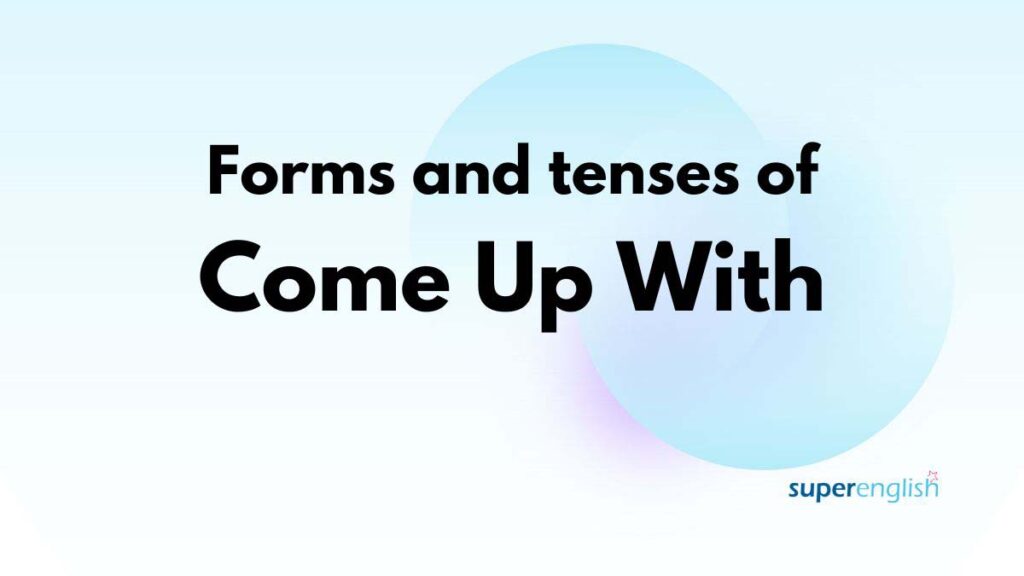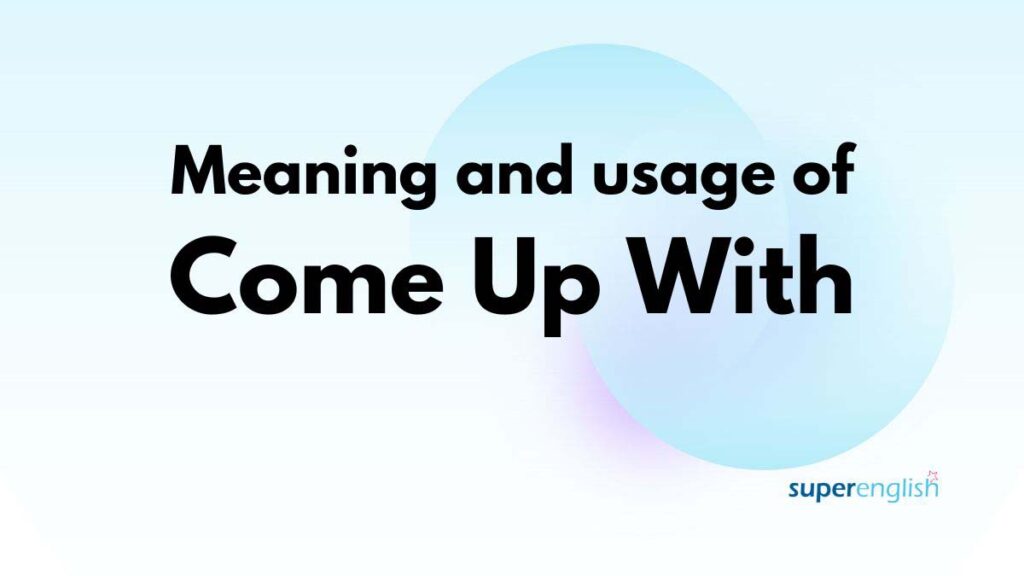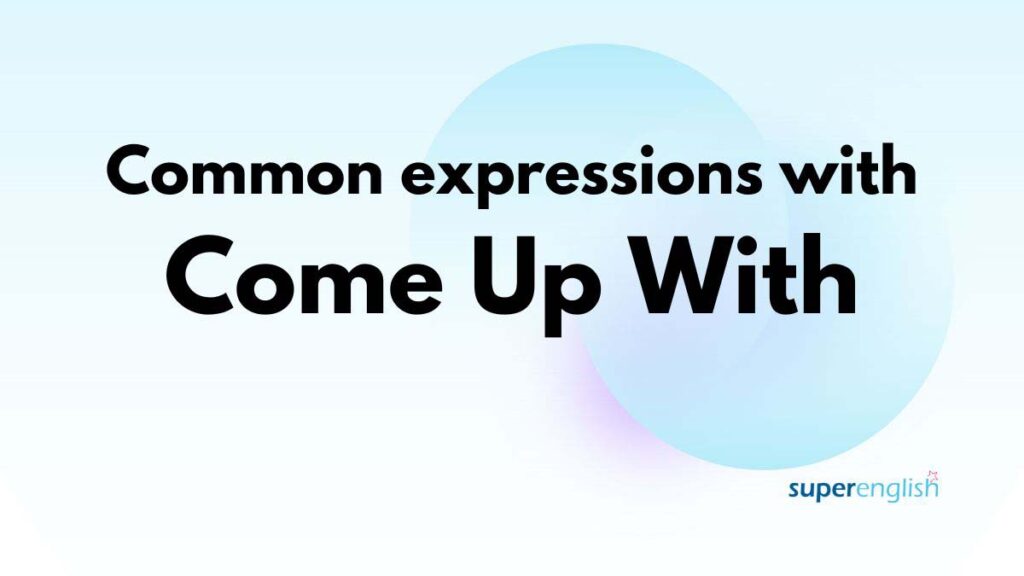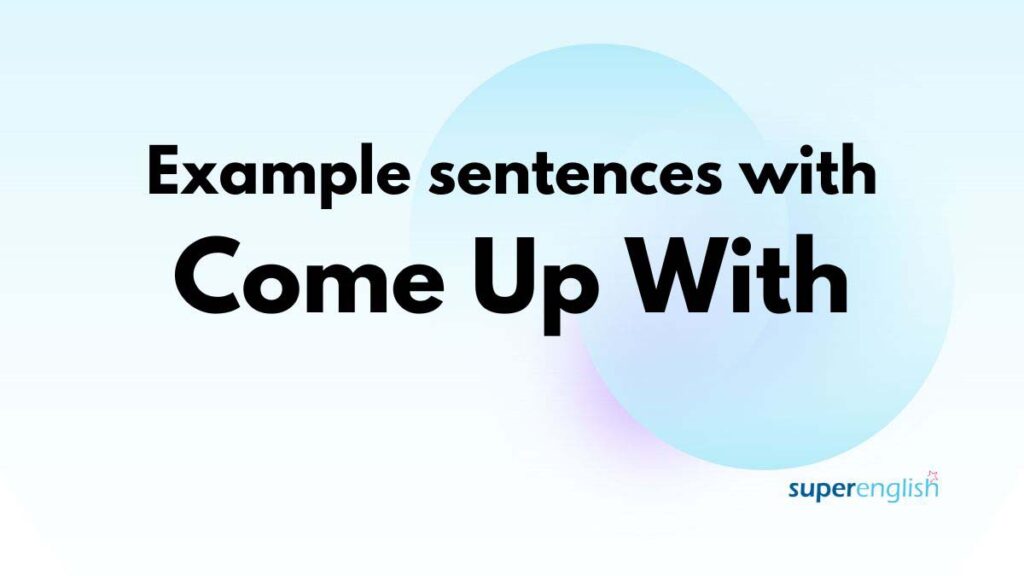
Table of Content
- Definition of Come up with
- Forms and tenses of Come up with
- Meaning and usage of Come up with
- Common expressions with Come up with
- The list of synonyms for Come up with
- The list of antonyms for Come up with
- 50 Example sentences with Come up with
Definition of “come up with”: the exact definition of the phrasal verb “come up with” and how it is used in a sentence
“Come up with” is a phrasal verb that means to think of or produce something, usually an idea, plan, solution, or excuse. It is often used when someone is trying to find a way to solve a problem or meet a need.
- Here are a few examples of how “come up with” can be used in a sentence:
- I’m sorry, I can’t come up with a solution to your problem right now.
- Can you come up with any ideas for our team’s next project?
- She’s always able to come up with creative solutions to difficult problems.
- I’m having trouble coming up with a good excuse for being late.
- He’s been trying to come up with a way to fix the leaky roof.

Forms and tenses: the different forms and tenses of “come up with” and examples of how to use each one
“Come up with” is a transitive phrasal verb, which means that it takes an object. The verb “come” is an irregular verb, so it has different forms in different tenses. Here is a list of the different forms and tenses of “come up with” and how they can be used in a sentence:
- Simple Present: I come up with an idea. (This is used to describe a regular or habitual action.)
- Simple Past: I came up with an idea. (This is used to describe a past action that has already been completed.)
- Present Continuous: I am coming up with an idea. (This is used to describe an action that is in progress at the moment.)
- Past Continuous: I was coming up with an idea. (This is used to describe an action that was in progress at a specific time in the past.)
- Present Perfect: I have come up with an idea. (This is used to describe an action that was completed at some point in the past, but the time is not specified.)
- Past Perfect: I had come up with an idea. (This is used to describe an action that was completed before a specific time in the past.)
- Future Simple: I will come up with an idea. (This is used to describe an action that will be completed at some point in the future.)
- Here are a few examples of how these forms and tenses can be used:
- Simple Present: I come up with a new recipe every week for my cooking blog.
- Simple Past: I came up with a plan to fix the leaky roof last night.
- Present Continuous: I am coming up with a list of potential candidates for the open position.
- Past Continuous: I was coming up with a budget for my trip when you called.
- Present Perfect: I have come up with a few different names for my new business, but I’m not sure which one to choose.
- Past Perfect: I had come up with a solution to the problem before the meeting, but I didn’t have a chance to present it.
- Future Simple: I will come up with a good excuse for missing the meeting by tomorrow.

Meaning and usage: the different meanings and uses of “come up with” and examples of how to use it in different contexts.
“Come up with” can be used in a variety of contexts to mean different things. Here are some of the most common meanings and uses of “come up with,” along with examples of how to use it in each context:
- To think of or produce something, usually an idea, plan, solution, or excuse:
- I’m sorry, I can’t come up with a solution to your problem right now.
- Can you come up with any ideas for our team’s next project?
- She’s always able to come up with creative solutions to difficult problems.
- I’m having trouble coming up with a good excuse for being late.
- To produce something, usually something physical, tangible, or visible:
- He came up with a new invention that solves a common problem.
- They came up with a prototype for the new product.
- The artist came up with a beautiful painting.
- To find or discover something, usually something that was previously hidden or unknown:
- The detective came up with a clue that helped solve the case.
- The archaeologists came up with an ancient artifact during their excavation.
- I came up with an old photo from my childhood while cleaning out my closet.
- To present or offer something, usually for discussion or consideration:
- The lawyer came up with a proposal for a settlement.
- The journalist came up with a theory about the cause of the accident.
- The teacher came up with a new approach to teaching the subject.
- To suggest or propose something, usually a plan or solution:
- Can you come up with a way to fix the leaky roof?
- I came up with an idea for a new marketing campaign.
- They came up with a plan to reduce the company’s carbon footprint.
- To invent or fabricate something, usually something that is not true or real:
- He came up with a fake excuse for missing the meeting.
- She came up with a story to explain her absence.
- They came up with a lie to cover up the mistake.

Common expressions with “come up with”: some common expressions that use “come up with” and their meanings and uses
Here are a few common expressions that use “come up with” and a brief explanation of their meanings and uses:
- “Come up with the goods”: This expression means to produce or deliver something that is expected or required, often in a satisfactory or impressive way. It can be used in a variety of contexts, such as business, sports, entertainment, or personal relationships.
- The chef came up with the goods and created a masterpiece of a meal.
- The team came up with the goods and won the championship.
- The actor came up with the goods and gave a great performance.
- The friend came up with the goods and helped me out when I needed it.
- “Come up with the goods or services”: This expression is similar to the one above, but it specifically refers to producing or delivering something that is related to business or commerce. It can be used in contexts such as sales, marketing, or customer service.
- The company came up with the goods and services that the customers wanted.
- The seller came up with the goods and services that the buyer needed.
- The retailer came up with the goods and services that the market demanded.
- “Come up with a blank”: This expression means to fail to produce or remember something that is expected or needed, usually an idea, solution, or answer. It is often used in contexts such as problem-solving, brainstorming, or testing.
- I tried to come up with a solution to the problem, but I came up with a blank.
- We brainstormed for an hour, but we came up with a blank.
- She was asked a difficult question, but she came up with a blank.
- “Come up with a scheme”: This expression means to plan or devise something, often something sneaky or dishonest, in order to achieve a goal or gain an advantage. It is often used in contexts such as business, politics, or social situations.
- The company came up with a scheme to trick customers into buying their products.
- The politician came up with a scheme to win the election.
- The kids came up with a scheme to get out of doing their homework.
- “Come up with a story”: This expression means to invent or fabricate a narrative or explanation, often in order to deceive or mislead someone. It is often used in contexts such as lies, excuses, or cover-ups.
- He came up with a story to explain his absence from work.
- She came up with a story to avoid getting in trouble.
- They came up with a story to cover up their mistake.
The list of synonyms for “Come Up With”
These words can be used interchangeably with “come up with” to convey the idea of producing, inventing, or creating something, often an idea or solution.
Here is a list of synonyms for “come up with”:
- Invent
- Create
- Generate
- Devise
- Formulate
- Produce
- Conceive
- Originate
- Think up
- Design
- Develop
- Craft
- Imagine
- Fashion
- Construct
- Coin
- Cook up
- Dream up
- Compose
- Brainstorm
The list of antonyms for “Come Up With”
These words represent concepts opposite to “come up with” and imply actions of not producing, inventing, or creating something, often due to neglect or abandonment.
Here is a list of antonyms for “come up with”:
- Forget
- Lose
- Misplace
- Abandon
- Neglect
- Disregard
- Ignore
- Miss
- Overlook
- Fail to produce
- Fail to create
- Leave behind
- Discard
- Give up
- Neglect
- Forsake
- Disown
- Surrender
- Relinquish
- Discontinue

50 example sentences for Come Up With phrasal verb
- I’m sorry, I can’t come up with a solution to your problem right now.
- Can you come up with any ideas for our team’s next project?
- She’s always able to come up with creative solutions to difficult problems.
- I’m having trouble coming up with a good excuse for being late.
- He’s been trying to come up with a way to fix the leaky roof.
- Can you come up with a list of potential candidates for the open position?
- She’s really good at coming up with puns and jokes.
- I’ve been trying to come up with a plan for my future, but I’m having trouble deciding what to do.
- Can you come up with a reasonable explanation for why you were late?
- He’s been working on coming up with a new business idea.
- I’m having trouble coming up with a name for my new blog.
- Can you come up with a catchy slogan for our company?
- She’s always able to come up with unique and interesting gift ideas.
- I’m trying to come up with a budget for my trip, but it’s difficult to estimate all the costs.
- Can you come up with a list of potential risks for the new project?
- He’s been trying to come up with a way to improve the efficiency of the manufacturing process.
- I’m having trouble coming up with a good excuse for not doing my homework.
- Can you come up with a list of potential sponsors for the event?
- She’s really good at coming up with clever marketing ideas.
- I’ve been trying to come up with a plan to save more money, but I’m not sure where to start.
- Can you come up with a reasonable explanation for why the project is running behind schedule?
- He’s been working on coming up with a new recipe for his cooking blog.
- I’m having trouble coming up with a name for my new product.
- Can you come up with a catchy tagline for our brand?
- She’s always able to come up with innovative design ideas.
- I’m trying to come up with a budget for my wedding, but it’s hard to estimate all the expenses.
- Can you come up with a list of potential suppliers for the new project?
- He’s been trying to come up with a way to reduce the company’s carbon footprint.
- I’m having trouble coming up with a good excuse for missing the meeting.
- Can you come up with a list of potential investors for the startup?
- She’s really good at coming up with engaging social media content.
- I’ve been trying to come up with a plan to improve my work-life balance, but I’m not sure where to start.
- Can you come up with a reasonable explanation for the discrepancy in the report?
- He’s been working on coming up with a new workout routine.
- I’m having trouble coming up with a name for my new website.
- Can you come up with a catchy slogan for our new product launch?
- She’s always able to come up with unique and memorable event ideas.
- I’m trying to come up with a budget for my home renovation, but it’s difficult to predict all the costs.
- Can you come up with a list of potential partners for the new venture?
- He’s been trying to come up with a way to streamline the company’s operations.
- I’m having trouble coming up with a good excuse for not completing the task on time.
- Can you come up with a list of potential customers for the new service?
- She’s really good at coming up with engaging content for her blog.
- I’ve been trying to come up with a plan to improve my health, but I’m not sure where to start.
- Can you come up with a reasonable explanation for the error in the report?
- He’s been working on coming up with a new approach to his work.
- I’m having trouble coming up with a name for my new business.
- Can you come up with a catchy slogan for our marketing campaign?
- She’s always able to come up with creative and unique ideas for her art projects.
- I’m trying to come up with a budget for my vacation, but it’s hard to estimate all the expenses.
